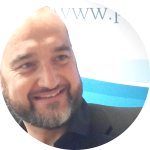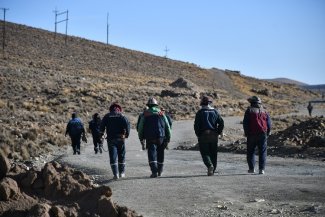Many young people make a living from unlicensed street vending despite often having a high level of qualifications and vocational training. But there is a lack of political will to tackle the situation, and Cameroon has become a ticking time bomb waiting to explode. Yaoundé (Cameroon) 13 July 2017
In his light-coloured suit, Thierry Ngo is a picture of elegance. He works as a journalist for one of Cameroon’s major television stations and is a young executive within the Cameroon Journalists’ Trade Union (CJTU/SNJC). He has been observing the crisis affecting the English-speaking regions in the Southwest and Northwest of the country for years.
“The tensions are not linked to languages, despite what we may have heard. The crisis is, in fact, social and political. The families who were running the country before it gained independence, on 1 January 1960, are still there today. I have witnessed the outbreaks of violence: schools were burned down, shops were destroyed, people were attacked.”
President Paul Biya, 84, and in power since 1982, was elected to serve another seven-year term on 9 October 2011. And there is good reason to believe that the leader of one of the richest countries in Central Africa will yet again stand for re-election in 2018.
“In the English-speaking regions, the public is calling either for secession or a return to federalism,” explains Denis Nkwebo, a journalist for the daily newspaper Le Jour and president of the CJTU/SNJC.
“It is a result of the malaise that has lasted for generations. And it is the young people who are on the streets in the big cities. Over half of the population has nothing to do,’’ he says.
’’There is a political, economic and social deadlock and it has turned the country into a time bomb. It won’t take much for Cameroon to erupt into violence.”
He adds: “Take the young people working as moto-taxi drivers or unlicensed street vendors, for example. They often have a high level of qualifications and good vocational training, but they can’t find work and end up in low-skilled jobs. The situation is potentially explosive. And it does, in fact, explode from time to time.”
Press muzzled
Cameroon’s journalists, as witnesses of everyday life in the country, pay the consequences of this tense situation.
“There are a number of taboo subjects in Cameroon, such as democracy, political power alternation, national security, Boko Haram or certain coverage about the president of the Republic. Seven journalists are currently behind bars for writing about events that should not be covered,” says Nkwebo.
“Political corruption, the misappropriation of public funds, bad governance, that’s the Cameroon of today. The media is the only place where one can read or hear conflicting opinions. But media outlets are suspended or closed down for expressing opinions the authorities don’t like,’’ he says.
’’When politicians are incapable of resolving their country’s problems, they find a scapegoat. It is much easier to condemn a journalist. That’s what happened with the Radio France Internationale correspondent, Ahmed Abba, who has been in jail since 2015 and received a 10-year prison sentence and a heavy fine of 56 million CFA francs [US$98,000]!”
The six other English-speaking journalists currently in jail were not arrested during a public demonstration, or for setting fire to a public building, but were taken from their homes by the police. It is still not known why or where they are being held.
“A journalist’s place is not in prison,” Nkwebo insists. “After denouncing press offences, Cameroon has moved on to the next level, which is the criminalisation of journalism as a profession. They are detained for questioning because they are journalists, not because they have committed an offence. Not a single political party, parliamentarian or senator has expressed an opinion on the subject. They are reduced to silence by the endemic corruption, which means they have to protect themselves.”
Cameroon looks good on paper, with its progressive labour law and the signing of collective agreements, but this is merely a facade, as shown by the latest survey of the International Trade Union Confederation.
“Absolutely! Our country has very good texts, but they are not implemented,” confirms Thierry Ngo.
“In the press, for example, many people earn as little as 50,000 CFA francs a year [US$88]. We are trying to have salaries raised to 75,000 CFA francs [US$132], but it’s very difficult.”
Despite his equanimity and his discerning analysis of the situation, the young journalist’s words are very emotive when he speaks of his future. “What sense is there to my life under these circumstances? Sometimes I feel ready to die to improve the situation, for my children, for my colleagues. I, personally, have never known any other president than this one. I chose journalism because it is a passionate profession; it’s an area where I can contribute to society. I wanted to be the voice of the voiceless. It is a just cause, and if I manage to defend it I will have fulfilled my mission. I’m no longer afraid of being imprisoned.”
Growing mobilisation
What is the likelihood of the young people aged under 35, who make up 75 per cent of the population in Cameroon, making their voice heard and taking control of their future?
“In the world of work, 90 per cent of the active population is young, but only one per cent is unionised,” says Antoinette Tangono Ekoan, president of the national labour confederation, the CCT. “It has to be said that trade unions do not provide room for young people in their texts or in their structures. That’s why many of them have no interest in trade unionism, although unionisation is fundamental to the defence of our rights here in the countries of central Africa.”
Young people very rarely join trade unions or political parties.
“Very few of them, moreover, are registered to vote,” says Nkwebo. “Most of the posts in trade union centres, political parties, and on the boards of public and semi-public companies are held by people aged over 75 years old. There is no hope of renewing the political class or political involvement in general. We’ll see in October 2018 if there is any change. We have only had two presidents of the Republic since 1960. And this record kills young people’s hope.”
In spite of everything, the social movement is strong: organisations are being created within many sectors (education, justice, media, etc.) and they are mobilising.
“The lack of transparency and political renewal, together with extreme corruption in the halls of the Republic, are fuelling the tensions and resentment. Everyone here in Cameroon is convinced that those in power are doing everything to ensure that nothing changes,” says Nkwebo.
“Freedom of expression is not given. Freedom of the press will never be granted. All the freedoms we have in Africa have been fought for tooth and nail.”
“As with the Arab Spring, the young people in Cameroon are determined to make their voice heard,” concludes Ngo. “As a young person from Cameroon, I do not see many solutions. But, like in 1960, I believe that only the young generation is capable of realising the dream of renewal.”










